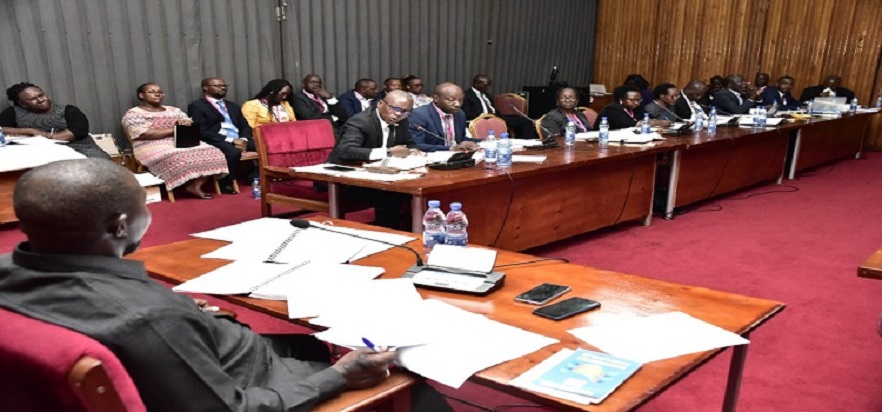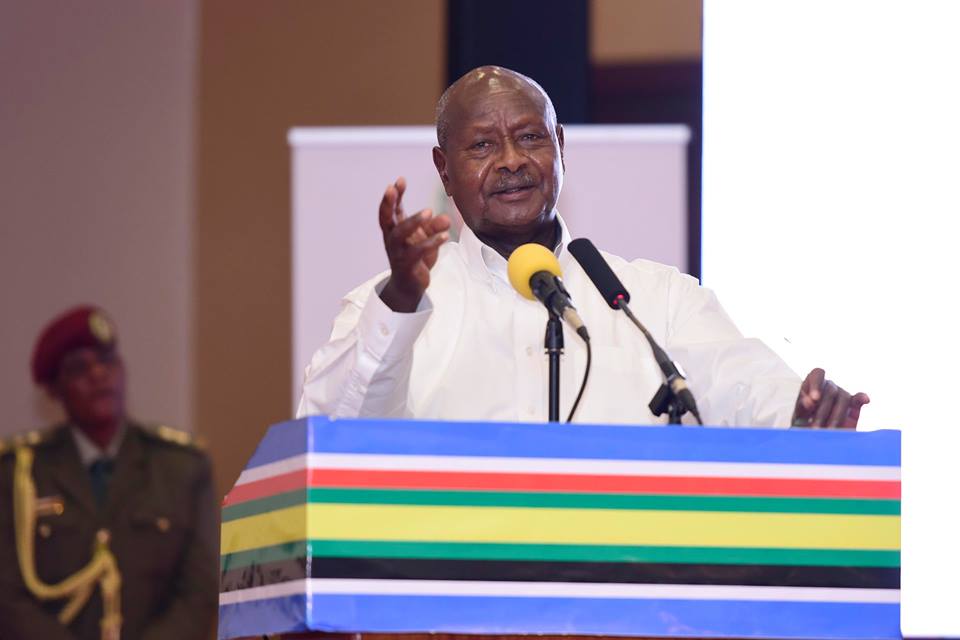The PAC(Central) chaired by Hon. Asuman Basalirwa interacted with officials from the Agriculture Ministry
The Ministry of Agriculture, Animal Industry and Fisheries has revealed that plans are underway to ensure that Uganda starts manufacturing Anti-tick and Foot and Mouth Disease (FMD) within two years.
The revelation was made by Fred Mayanja, Commissioner Agriculture Planning and Development at the Ministry of Agriculture, while appearing before Parliament’s Public Accounts Committee to respond to queries raised in the June 2021 Auditor Generals’ report, where he revealed that the project is being spearheaded by the National Agricultural Research Organisation (NARO) at their facility in Nakyesesa in Gayaza-Wakiso district.
“They want to produce what you call foundation strain which can be multiplied, but we first tracked the one of the tick because the tick had become so strained and now they are in field trials before we roll out the complete manufacturing. Manufacturing of a vaccine which is living organism is very complicated and there is a lot of international accreditation that is required and also protection from the big companies internationally,” said Mayanja.
This followed a query asked by Sarah Opendi (DWR Tororo) who asked the Ministry of Agriculture to explain plans to have their own plant to manufacture FMD vaccines remarking, “These wonderful scientist, what efforts are they making to have this foot and mouth disease manufactured in this country? Why would government spend Shs50Bn giving Dr Musenero, is it because Ministry of Agriculture hasn’t made a case? Because Covid had just come and Shs50Bn had to be availed, what about Foot and Mouth Disease that affects animals?”
The Auditor General raised concern on the delays in the delivery of FMD vaccines, noting that in May 2020 one contractor KEVEVAPI was awarded a contract to supply 700,000 doses of FMD vaccines, however only 500,000 doses were delivered, yet the same supply delayed by 4months.
The same contractor in 2020 was yet again awarded a similar contract to supply 2,311,000 doses but none of the said doses were delivered within the contract period of 22nd July 2020, and it wasn’t until later when 1,200,000 doses were delivered later and again 500,000 were delivered in 2021 and 611,000 doses are still outstanding by the time of audit.
Mayanja blamed the delayed delivery on the Covid-19 pandemic that disrupted international carriage services that affected deliveries of raw materials by the manufacturers.
“The scarcity of aluminum hydroxide gel which is adjuvant for both the FND vaccine as well as the Covid-19 vaccine, which resulted into unprecedented shortage of FMD vaccines. On the other side, NARO is in the process of establishing the vaccine manufacturing infrastructure at Nakyesasa such that in future we don’t have such challenges,” Mayanja.
However, a section of legislators like Basil Bataringaya (Kashari North) rejected the excuse made by the Ministry arguing that every year, FMD breaks out in different parts of the country, and the Ministry is in the habit of reacting when they hear that FMD has broken out in a given area of the country without putting in place a sustainable plan.
“Why can’t we vaccinate because these 611,000 doses aren’t enough for even the cattle in Ankole sub-region alone. So these doses are too few for the country meaning that this FMD issue is going to appear in the next audit,” asked Bataringaya.
The same sentiments were shared by Asuman Basalirwa (Bugiri Municipality) who argued, “I think the biggest issue relates to planning, you see FMD occurs annually, so in terms of planning, how do you prepare yourselves and the country that in case of an outbreak, you now have enough vaccines to deal with the situation? We are talking about the quantities and availability in case of an outbreak.”
Ronald Ssegawa, Under Secretary Finance and Administration at Ministry of Energy replied saying that every year, the Ministry budgets for the purchase of FMD vaccines but the budget of the vaccine is very small and it can’t serve more than 14million heads of cattle, which has prompted Government to concentrate on cattle at the cost of other animals.
He said that in Africa, there are two countries that are manufacturing the vaccine, that is Kenya and Botswana, but the supply of the vaccines was as a result of the pandemic, remarking, “So when we made this budget, we made this order and because we were told by the scientists that the same element was being used to manufacture this FMD Vaccine, they were the same that were being used to manufacture Covid-19 vaccine so the raw materials were scarce and they kept on delaying, but when Covid-19 relaxed, they were able to manufacture these vaccines and send them to us.”
The development comes at the time in November 2022, Speaker Among tasked the Ministry of Agriculture to explain how Shs25Bn allocated for the production of foot and mouth disease was used in the midst of the recent outbreak of the deadly virus amongst the cattle population in Uganda.
It should be recalled that in November 2021, Parliament approved a supplementary request by Ministry of Agriculture, seeking for Shs95.216Bn and of this money, Shs70Bn was meant for the procurement of 200 assorted tractors, implements and accessory units and Shs25Bn was meant to finance shortfalls on vaccines for control of Foot and Mouth Disease.





